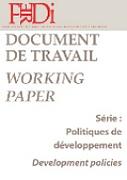



The paper starts with a presentation of the TFA noting its two principal characteristics. First, the TFA is a rules-based bottom-up approach built into the agreement that takes into account countries’ implementation capabilities, an important feature for the three groups of UN vulnerable countries. Second, the TFA provisions are monitorable (e.g. provisions like the publication of information, advance rulings, appeal or review of decisions, transparency, and border agency cooperation). In preparation for the agreement, the OECD has assembled large amount of indicators of the state of implementation of provisions in the TFA summarized in a TFI (Trade Facilitation Index). TFI values for 2019 are then used to evaluate econometrically the impact of implementing TFA on the waiting-time reduction at customs for a sample of 160 countries.
Average ad-valorem equivalents (AVEs) of reduction of time in customs estimates for each UN-grouping (LDCs, LLDCs, and SIDS) show averages in the range 2.1%-2.9% for imports and 1.9%-2-7% for exports. Larger gains are obtained for a more ambitious implementation of the TFA. Importantly, gains are larger for each of the three groupings than for other developing countries, a corroboration that the UN vulnerable categories capture an aspect of vulnerability.
de Melo J., Sorgho Z., Wagner L. (2021) "Implementing the Trade Facilitation Agreement (TFA): estimates of reduction in time at customs for the United Nations’ vulnerable economies" Ferdi Document de travail P296, novembre